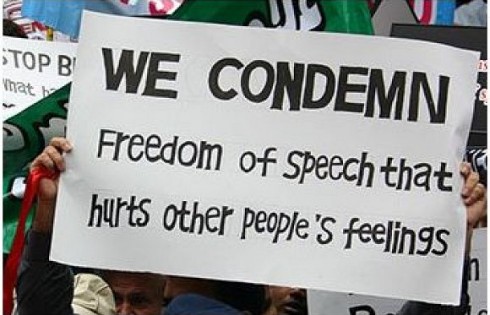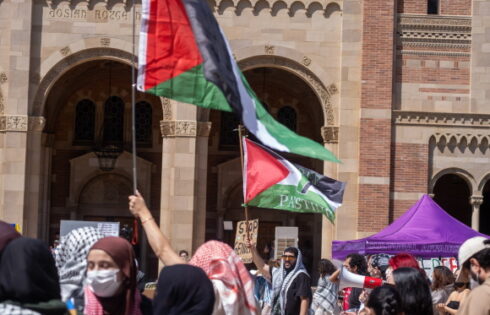 What is with college students making everything political? One would think food—especially a delicious Mediterranean spread enjoyed by both Israelis and Palestinians—would be spared this injustice. Apparently, nothing goes unnoticed at the Ivy League. Not even hummus.
What is with college students making everything political? One would think food—especially a delicious Mediterranean spread enjoyed by both Israelis and Palestinians—would be spared this injustice. Apparently, nothing goes unnoticed at the Ivy League. Not even hummus.
Why is such a harmless food item being spotlighted, one might ask? The Princeton Committee on Palestine is pushing for the removal of Sabra Hummus from University Stores. They cite Sabra’s partial owner—the Strauss Group—as a supplier of care packages to the Golani Brigade of the Israeli Defense Forces. This attack on hummus is an attack on Israel’s legitimacy. Efforts to delegitimize the state of Israel under the guise of divestment from companies funding Israel—which is a very familiar tactic at UC-San Diego and UC-Berkeley—are foolish. Hummus is a harmless late night snack, not a political ploy.
Samson Schatz, chair of Tigers for Israel, writes about Sabra’s shareholders in The Daily Princetonian:
The truth is that 50 percent of Sabra Dipping Company is owned by PepsiCo, and 50 percent is owned by the Strauss Group, an Israeli company. The Strauss Group sponsors a range of community outreach programs, including raising money for premature infants in Serbia and providing scholarship funds to children with cancer. The Strauss Group’s list of projects also includes a “support the troops” program, for which the company provides care packages of free hummus to Israeli soldiers in the Golani Brigade. The company has not been providing weapons or ammunition; it is simply giving the 18-year-olds in uniform free hummus and a little moral support.
He also notes the irrelevant nature of highlighting the Israeli-Palestinian conflict by means of boycotting Sabra hummus:
You are being deceived because you are being made to believe that putting pressure on Israel is sufficient to resolve the conflict in the Middle East. The leaders of the anti-Sabra campaign imply that by attacking Sabra hummus or even divesting from Israel we can bring peace to the region. Israel is already making compromises. While we have been blinded by frivolous debate over a creamy, chickpea delicacy, Israeli Prime Minister Benjamin Netanyahu on Tuesday proposed to his cabinet a 90-day extension to the freeze on building settlements in the West Bank. Netanyahu hopes that the borders of the future Palestinian state will be decided within this time frame, which would render further discussion of settlement construction in Israeli territory moot. The Middle East conflict is more complicated than hummus. I strongly encourage this campus to focus its intellectual energy on the real issues rather than shift its focus to minute, immature and pathetic distractions.
The “Save the Hummus!–Vote Against the Sabra Hummus Boycott” event page on facebook notes backpedaling from the PCP on November 19th, 2010:
We are very excited to hear that, despite its initial advertising, PCP has backpedaled and no longer claims that its referendum is a direct call for the University to stop selling Sabra Hummus. Although the word “boycott” is not officially part of the referendum text, we still oppose this referendum because of its significant ambiguity and because it unfairly singles out Sabra Hummus.
The exact text of the anti-Sabra ballot resolution will be as follows:
“On behalf of the student body, the USG will make a formal recommendation to University Dining Services that it offer an alternative to Sabra Hummus in all university retail locations.”
This language is extremely ambiguous: does “offer an alternative to” mean an alternative in addition to or instead of Sabra? Although PCP originally aimed for this resolution to convince Dining Services to replace Sabra hummus with an alternative, as stated in the information on PCP’s Facebook group page and on PCP’s electronic petition, Bitran and PCP have since changed their message regarding the intent of this confusing text.
In a statement made to the Prince prior to the article published today, Bitran wrote that this referendum “asks the university to provide an alternative to Sabra. We don’t know what the university will do, whether they will sell Sabra and an alternative side by side, or how many of each.”
It is crucial that student governments refrain from political issues, especially when they are so divisive. Last year at UC-San Diego, our student government was faced with a resolution urging divestment from companies operating in “war zones” [read the fine print: doing business with Israel] — specifically naming companies with shareholdings there like GE. Regardless, political controversies should have no place in student government, which is supposed to be a voice for all of the students.
Tigers for Israel cites valid points in defense of Sabra hummus and Israel.
1. This boycott is far too broad a means of challenging human rights violations. Not all Golani Brigade soldiers are guilty of criminal behavior, and many of those who have committed crimes have, as acknowledged by PCP’s very own pamphlets, been convicted by Israeli courts. It is not right to hold the majority of soldiers responsible for the few, just as it would not be right to boycott Palestinian products because of the actions of a few terrorists.
2. The logic behind this boycott could be extended to include boycotts of various goods produced by American firms supporting US soldiers. Americans were guilty of terrible abuses of Iraqi prisoners at Abu Ghraib. Nonetheless, American courts still convict those who are guilty of war crimes. Should we boycott Boeing due to its contracts with the US Army just because of isolated cases of human rights violations by American soldiers? Absolutely not!
3. (NOTE: This paragraph was written prior to PCP’s backpedaling on the meaning of the referendum.) The advocates of the boycott condemn the lack of consumer choice available on campus when it comes to hummus. But their position is not the one of enhanced consumer choice. We would love to see the University offer multiple brands of hummus in its stores. When we have more options, everyone wins. But that DOES NOT require banning Sabra Hummus. The reason Sabra is the hummus brand of choice as of now is that it is very popular across the country. In fact, it was recently reported that Sabra sold 40% of all hummus in the US. The University’s decision to make Sabra its default hummus choice is perfectly logical. We’d all love more options, but eliminating Sabra from the equation simply is not the answer.
4. Some speak of Arabs being forced to support crimes against their own people since Sabra Hummus is the only brand available to them. While we do not argue that Sabra MUST be allowed to have a U-Store monopoly, we think it absurd to suggest that supporting a company that sends care packages to Israeli soldiers is indirect support for war crimes.
5. Context is critical here. This boycott unfairly targets Israel. We’re not seeing an attempt, for example, to boycott products which somehow support the Saudi government despite its truly widespread human rights abuses. And even were the student body to deem boycotts targeted at Israeli goods to be acceptable, where would this stop? Would we boycott Microsoft, Intel, Victoria’s Secret, and other mainstream companies based heavily in Israel? Surely the student body is not willing to take this misguided effort to its logical conclusion.
The Israeli-Palestinian conflict is a very complicated issue, and we concede that there’s room for improvement on all sides. Placing ALL of the blame on Israel is not going to bring peace to the region. Instead of furthering these divides through arbitrary boycotting, we should work to build bridges between both sides by engaging each other in constructive dialogue to find ways to end the conflict.
Frankly, I like my hummus and hate seeing this product go down by those eager to undermine Israel. Student governments have rejected all attempts to divest from Israel because it is pointless, divisive, and inappropriate to deliberate. Let’s keep it that way.
Like The College Fix on Facebook / Follow us on Twitter




Please join the conversation about our stories on Facebook, Twitter, Instagram, Reddit, MeWe, Rumble, Gab, Minds and Gettr.